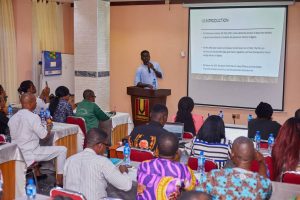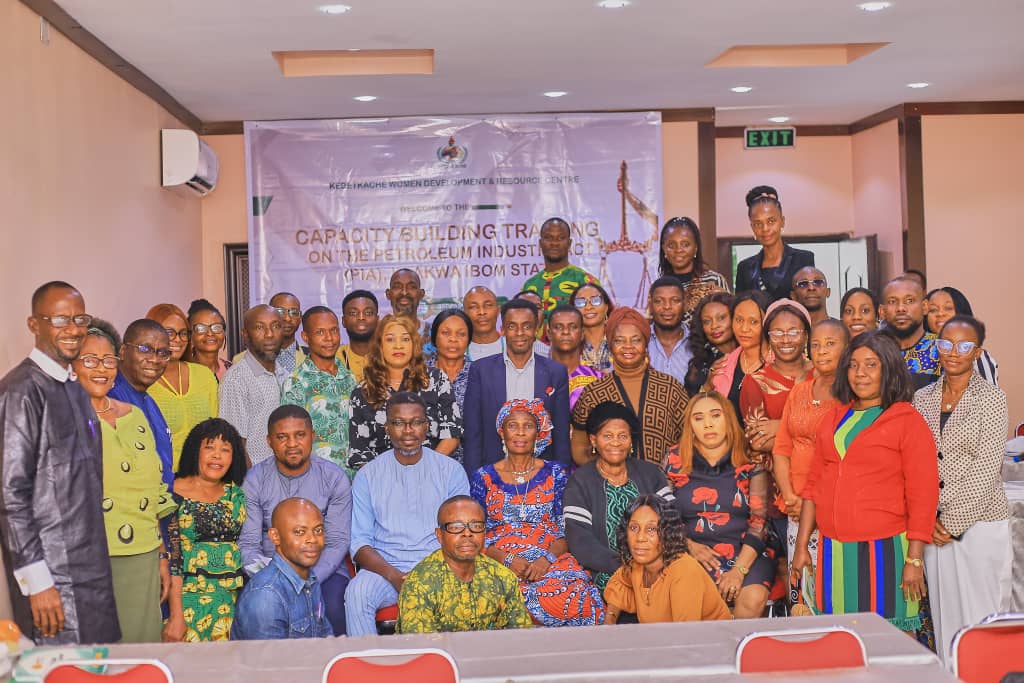Stakeholders in the oil-producing communities have been enjoined to acquaint themselves with the provisions of Petroleum Industry Act (PIA), which was signed into law by ex-President Muhammadu Buhari in 2021 for easy implementation.
The executive director of Kebetkache Women Development and Resource Centre, Emem Okon, PhD made the call at the end of a capacity building training organised by organization at Villa Hilton Hotels & Apartment, Ewet Housing Estate, Uyo, Tuesday.
Okon, who spoke with journalists, described the group as a Non- Governmental Organization, focused on grassroot women mobilization and organization, building of an eco-feminist movement and other thematic areas including environment, good governance, women’s rights, among others.
Speaking through the programme officer of Kebetkache Women group, Idongesit Smart, the Executive Director said the NGO is passionate about promoting and championing women activities and other social issues, saying that what informed the capacity training was lack of awareness on the part of oil producing communities in the Niger Delta Region on the PIA.
She stressed the need for the stakeholders to know their rights in terms of the three percent derivation funds prescribed to be used for community development.
The NGO Director, however, decried a situation where the settlors (oil companies) tend to have more powers in the resources more than the real owners, following the provisions of the PIA, and condemned divestment by some multinational oil companies operating in the Niger Delta Region, leaving the community people to suffer the liabilities and negative impacts of crude oil production.
Okon maintained that the essence of the event was to build the capacity of the oil producing communities in Akwa Ibom through their representatives to understand the workability of the Petroleum Industry Act and what the communities stand to benefit on Corporate Social Responsibility from oil companies operating in their environment.
According to her, participants at the training workshop were equipped with the knowledge on how to engage with the Host Community Development Trust Fund (HCDT) Committee members, in order to attract development to their communities and appreciated the resource person and participants who attended the event.
Talking on the topic: The Petroleum Industry Act: Protecting Community Interest Through Advocacy And Participation, Dr Tubodenyefa Zibima, a deputy director in the Institute For Niger Delta Studies, said there was need for participants to understand some frequently asked questions such as knowledge of the existence of the PIA, knowledge of the objectives of the host community trust fund, knowledge of the composition and selection criteria for the Trust Fund and Management Committee among other questions.
Zibima listed objectives of the capacity building workshop to include understanding the history and implications of the PIA on host community development, identify the formal instruments, structures and requirements for implementing the PIA and its host community component, track advocacy and implementation successes and failures, among others.
Explaining the purpose of the Petroleum Industry Act, he said it was to create efficient and effective governing institutions with clear and separate roles for the petroleum industry, establish a framework for the creation of a commercially oriented and profit-driven national petroleum company and to further deepen local content practice in Nigeria Oil and Gas Industry.


The resource person who also spoke on Framing Advocacy Around Host Community Component of PIA, maintained that under the objectives of the host community development component of the PIA, the settlors were expected to carry out the needs assessment within six months, after granting licence or lease.
He added that the settlors (the exploration and production companies) were also required to appoint a Board of Trustees (BoT) which will be registered as a corporate body by the Corporate Affairs Commission as well as prepare the constitution for the Host Community Development Trust.
Speaking too, Princess Victoria Umoh, a stakeholder in Kebetkache Women Development and Resource Centre, said when the group advocated the enactment of the PIA Bill, they thought it would come out clearly so that the host communities could own the process, expressing displeasure over the non-inclusion of the community roles in the PIA.
On the need for community representatives who have been trained and their capacities built, Princess Umoh advised them to go back to their communities and step down the training in order to educate the people on their rights and privileges as host communities to oil and gas companies to making a case for a bottom-up approach in the PIA arrangements.
The event brought together participants and stakeholders from different oil-producing communities in Akwa Ibom State, which include Mbo, Esit Eket, Ibeno, Onna and Uruan, among others.

